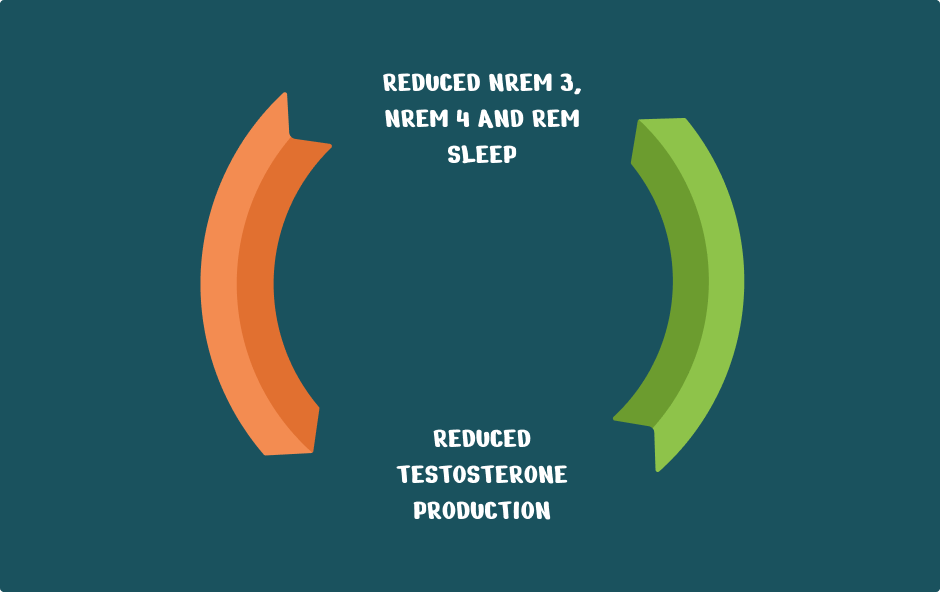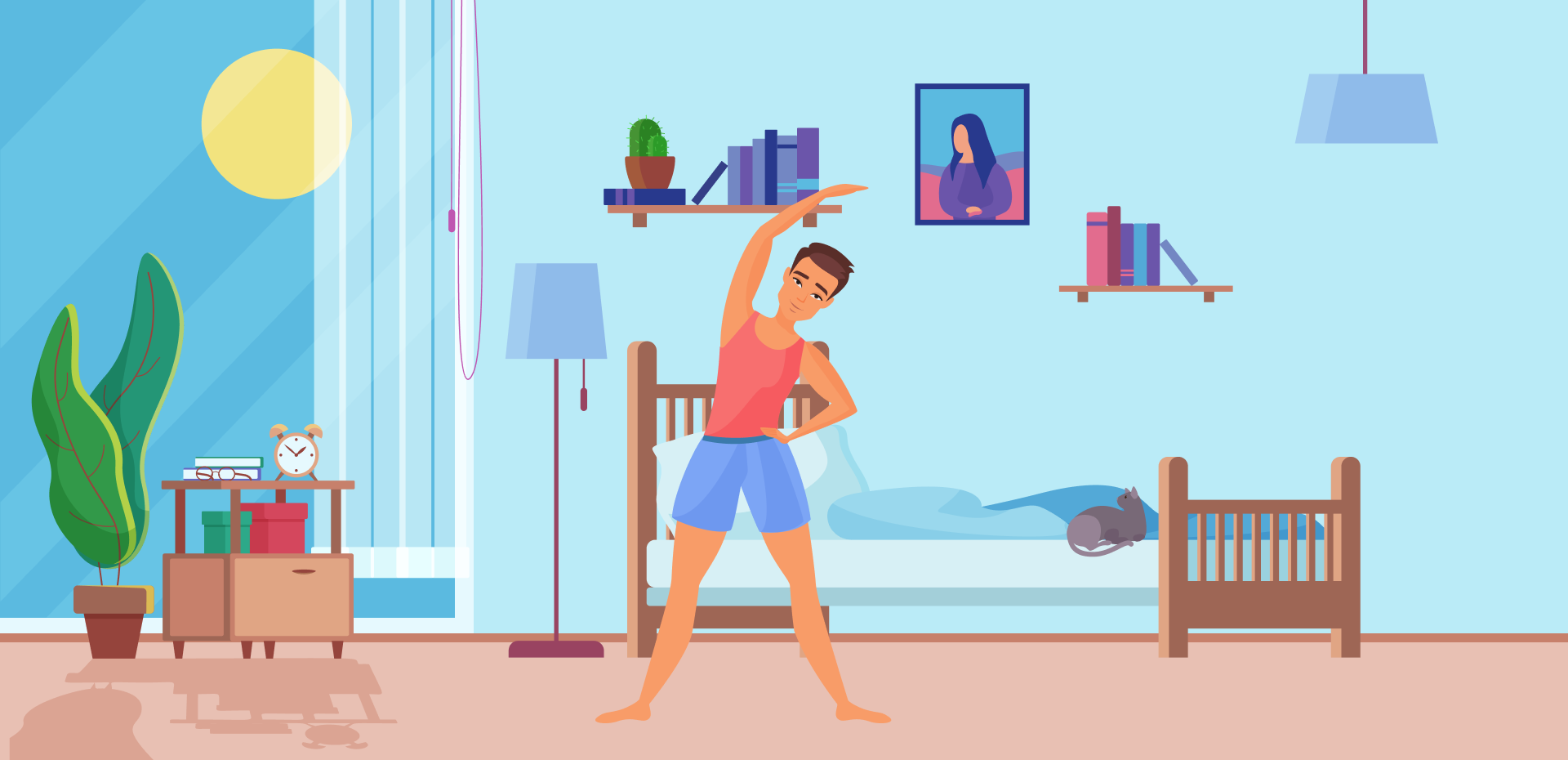
Is lack of sleep depleting men's testosterone levels?
It is strange how over different time periods, different things go from being taken for granted to attaining immense value. In the current era, sleep is becoming an increasingly scarce and valuable commodity. Several surveys have been taken over recent years, and all come to broadly the same conclusion that between a third and half of us are not getting enough good quality sleep.
Meanwhile, testosterone levels in men are dropping year on year. Could it be a coincidence or is something else going on?
Correlations certainly exist between sleep and testosterone levels, and a vicious cycle can easily get started. However, there are numerous other factors in play, too - more now than there have ever been before.
We will see that adopting a healthy sleep cycle is certainly a valuable first step towards maintaining healthy testosterone levels. However, it is not a cure-all solution.
Sleep - How Much Is Enough?
According to the Mayo Clinic, adult men need at least seven hours sleep every night. Contrary to popular belief, this applies to men aged 22 or 102; the requisite amount of sleep does not change as a man gets older, although his sleeping patterns might well do so.

Types And Stages Of Sleep
Most of us have heard of Rapid Eye Movement (REM) and non-Rapid Eye Movement (NREM) sleep stages. While we sleep, we alternate cyclically between these two stages, and a healthy night’s sleep will typically involve between four and six cycles. Exactly why we sleep in this way is still not fully understood, but researchers have established that irregularities in these cycles are associated with sleep disorders.
There is more going on when we have a good night’s sleep than just the REM and NREM stages. We spend about 75 to 80 percent of a healthy sleep cycle in NREM sleep, which itself comes in four stages.
| Sleep Stage | Percentage of overall sleep | Characteristics |
|---|---|---|
| NREM Stage 1 | 2-5 percent | A transitional stage, which usually lasts 1 to 7 minutes in the initial cycle, and is easily interrupted by a disruptive noise. |
| NREM Stage 2 | 45-55 percent | Lasts approximately 10 to 25 minutes in the initial cycle and lengthens with each successive cycle. An individual in stage 2 sleep requires more intense stimuli than in stage 1 to awaken. It is hypothesized that this stage is important for memory consolidation. |
| NREM Stage 3 | 3-8 percent | Slow wave sleep, mostly during the first third of the night |
| NREM Stage 4 | 10-15 percent | Slow wave stage two, this is when it is hardest to wake the sleeper up |
| REM | 20-25 percent | Defined by desynchronized brain wave activity, muscle atonia, and bursts of rapid eye movements. During the initial cycle, REM sleep lasts only 1 to 5 minutes. However, it becomes progressively prolonged with successive cycles. Dreaming is mostly associated with REM sleep. |
Are We Getting Enough Sleep?
One in three US workers say they get by on less than the recommended seven hours sleep per night, and about half say they routinely feel tired during the working day.
There is a general consensus that in our busy 21st century 24/7 lives, we get less sleep than our parents, grandparents and great-grandparents did when they were our age. Several studies have been commissioned on this topic that have carried out interviews and experiments as well as interrogating existing data.
The slightly surprising conclusion is that there is no evidence to suggest we are sleeping any less today than people were 10, 20, 50 or 100 years ago. Most studies have found the numbers approximately constant, and it is certainly true to say that if we are sleeping less, the reduction is very slight, in single digit minutes, so is unlikely to be pertinent.
What seems more likely is that our sleep patterns have changed, and we are spending more time in NREM stages 1 and 2, and are waking more, meaning that when we do cycle into deeper sleep, it only lasts a few minutes.
Testosterone
Everyone knows what testosterone is - or to be more accurate, everyone thinks they know what testosterone is. But the “masculinity” hormone is about more than making sperm and maintaining sex drive, although these are certainly part of its role.

Testosterone also contributes towards muscle tone, bone strength and production of red blood cells. It provides a boost to energy levels and is an important contributor to overall wellbeing.
Testosterone Levels Naturally Change Over Time
If the average man was fitted with a testosterone meter, it would be rising and falling like an EEG from morning till night. But taking a longer-term perspective, testosterone levels naturally drop as we get older. In other words, a drop in testosterone might be perfectly normal, and it is important to keep that in mind before blaming other factors.


The Effect Of Lower Testosterone
As we already mentioned, testosterone is about more than male libido. A drop in testosterone can have several adverse consequences, including low energy, reduced bone mass, decreased muscle mass and other symptoms.
Low testosterone - Potential Symptoms
- Reduced sex drive
- Decreased muscle mass
- Erectile dysfunction
- Enlarged or tender breasts
- Reduced sperm count
- Increased sleepiness
- Low energy
- Poor concentration
- Decreased bone mass
Andropause - Fact Or Fiction?
Plenty has been said and written about andropause or the “male menopause” over the past 20 years or so, but very little before then. Does that mean we are living in more enlightened times, or is it a new phenomenon? Or perhaps we are chasing shadows and it is a millennial media construct?
Unsurprisingly, the truth spans all three answers. What we call something is really of secondary importance, but medical practitioners agree that the phrase “male menopause” is an unhelpful misnomer. In women, menopause occurs when ovulation ends. Hormone production plummets dramatically in a relatively short period of time. In men, the decline in testosterone and other hormones is a far more gradual process that occurs over a period of years.
As a result, women are far more likely to experience pronounced consequences of menopause. Men usually go through the process of age-related low testosterone with minimal symptoms. Experts only usually recommend testing for low testosterone when subjects are experiencing significant symptoms such as those outlined above.

Ways Of Increasing Testosterone, Naturally And Therapeutically
There are several possible types of therapy available to men with low testosterone. Testosterone therapy treatment is available from medical practitioners, but it shows wildly variable results. Some men have found it quickly relieved symptoms, while others saw no discernible changes.
Of course, there are testosterone boosters that can be purchased online or over the counter, but these need to be treated with extreme caution. Some are effective, but there are plenty of snake oils out there, too. Blindly taking testosterone boosters could do more harm than good if you have not first been properly assessed by a physician - a little like learning to run before you can walk. Also, be aware of potential side effects, which can include mood swings, reduced sperm count and even hair loss.
A better approach is to assess your overall health and diet. There are some natural supplements that can help with testosterone production and are also beneficial to overall health. Far better to stick with something natural that certainly won’t do any harm and might just do some good!
Natural Testosterone Boosters
- Ginger
- Onions
- Oysters
- Pomegranates
- Leafy green vegetables
- Fatty fish, such as mackerel, salmon or herring
Myths and misconceptions about testosterone
We said at the outset that everyone thinks they understand what testosterone is and what it does. However, there are plenty of misconceptions and urban myths that do the rounds, and never more so than in the information - or misinformation - age.
Contrary to what you might have been told, testosterone is not just a “male sex hormone” there is much more to it than that. Higher testosterone doesn’t automatically mean better “performance” between the sheets, and it doesn’t make a man better at sport or more likely to take risks
Debunking Some Myths About Testosterone
-
Testosterone is not just a male hormone
Testosterone is produced in women’s ovaries, adrenal glands, fat cells, and skin cells, and supports various important functions. However, it is true that men produce 10 to 20 times as much testosterone as women.
-
High testosterone will not give you prostate cancer
This was a myth perpetuated by some early scientific research. However, the latest studies have found no correlation between elevated testosterone levels and risk of prostate cancer.
-
Elevated testosterone will not make you a God in bed
Testosterone has an impact on libido, but in combination with many other factors. Of itself, testosterone level is unlikely to have a significant impact except in those on extreme ends of the scale.
-
Testosterone boosting supplements are unlikely to solve your problems
Most of those testosterone supplements on the market promising to boost your sex drive or give you bulging muscles are untested by bodies like the FDA. They can do more harm than good, so treat them with caution.
-
Testosterone doesn’t make men angry
If anything, the opposite is true, as low testosterone can cause mood swings, depression and irrational thinking. Optimal testosterone contributes to mental and emotional wellbeing.
Testosterone And Sleep
There have been a handful of studies that have specifically looked at the relationship between testosterone and sleep. One of the most comprehensive was carried out at the University of Chicago and involved 10 male volunteers in their mid-20s from the University campus. The study was spread over a period of more than six years.
Put simply, the men were subjected to week-long periods of set bed times and waking times, ranging from a week where they had 10 hours sleep each night to a week of five hours per night. Various measures were taken, including testosterone level, vigor, alertness, sleepiness and so on.
Full details of the study can be found in the references, but to cut to the chase, testosterone levels throughout the day were consistently higher when the subjects had more sleep.

What About Quality Of Sleep?
The study shows a compelling case for the argument that sleep deprivation can lead to reduced testosterone. That, however, falls into the “interesting, but only just” category in view of our earlier conclusion that men are getting approximately as many hours sleep in 2023 as they were getting in 1923 and all points since.
What we suggested, however, was that sleep patterns are changing, so we really need to see how sleep quality might correlate with testosterone, not quantity. Scientists have identified a sleep-dependent increase in testosterone that requires the sleep cycle we spoke about at the beginning to run for at least three hours, ideally longer. When we get to bed late and are then constantly interrupted by external stimuli, from a restless partner to a buzzing phone, that cycle never gets a chance to get far beyond its first or second go-around.
It is easy to see how this can lead to a vicious cycle, with low testosterone having its own independent impact on sleep quality, which further impacts production of testosterone.

Don’t Get Blinkered
We have established that the natural drop in testosterone can be exacerbated by poor sleep patterns, and we will look at ways to address that in just a moment. However, it is important to stay aware of the bigger picture. The relationship between sleep and testosterone levels is an important one, but abnormal or interrupted sleep patterns are not the only possible causes of reduced testosterone.
There are numerous other reasons for testosterone levels to drop. These include general lifestyle changes in the 21st century. In previous generations, a higher proportion of men were engaged in strenuous manual labor in their day to day work. Also there were more smokers - some studies suggest that nicotine reduces testosterone breakdown. Before you reach for the cigarettes, however, note that all studies agree that any such marginal benefit is outweighed by harmful effects of smoking. Stress and obesity are also potential causes. Some studies have even suggested that tight-fitting underwear can have an impact on testosterone production.
Potential Triggers For Reduced Testosterone
- Poor sleep
- Medical conditions like diabetes
- Obesity
- Excessive consumption of alcohol
- Sedentary lifestyle
- Recreational drug use
- Stress
- Testicular injury
- Quitting smoking
Breaking The Cycle
It is not enough to say “get seven hours sleep every night and all will be well.” For sure, it will help if you are currently getting by on four or five hours, but we have established that where sleep is concerned, quality is as important as quantity. This is where most people fall short.

Unfortunately, improving quality of sleep is not such a straightforward proposition as increasing quantity. After all, anyone can simply go to bed an hour earlier. Improving quality of sleep is all about establishing a healthy sleep routine.
| Establishing A Healthy Sleep Routine | |
|---|---|
| Get more light during the day | Exposure to natural sunlight or bright artificial light during the day helps keep the circadian rhythm healthy. It improves both daytime energy and nighttime sleep quality. |
| Reduce exposure to blue light in the evening | This directly correlates to the previous point. Smartphones, TVs and computers produce blue light that fools your body into thinking it is daytime. Ideally, switch everything off two hours before bedtime. Failing that, use an app that blocks blue light. |
| Get comfortable bedding | Your bed, mattress and pillow have a fundamental impact on sleep quality. Experiment with different firmness levels and ideally, renew every eight years. |
| Exercise during the day | Regular daytime exercise is one of the most effective ways to improve sleep, and is more beneficial than most drugs and supplements. However, don’t exercise immediately before bedtime, as adrenaline production can cause wakefulness. |
| Avoid eating and drinking late | A large meal before bed can trigger poor sleep and hormone disruption. Try to eat at least four hours before bedtime. Likewise, avoid drinks containing alcohol and caffeine in the evening, and don’t drink anything in the hour before bed. |
| Be consistent | To the extent possible, try to go to sleep and wake up at about the same time each day. That includes weekends. Your body’s circadian rhythm likes consistency and sleep quality will improve. |
| Optimize the sleeping environment | Eliminate external light and noise as much as you can, and aim to keep the room temperature at about 70°F / 20°C |
| Relax and de-stress | Sometimes easier said than done, but try to relax body and mind before sleep. There are various techniques you could try, including relaxing music, meditation, a hot bath and massage. |
A reduction in testosterone is a natural part of getting older. However, it can certainly be exacerbated by bad sleep habits, which can lead to a vicious circle. Establishing a healthy sleep routine will help to break the cycle.
However, be open to the possibility that other factors could be in play and try to take a holistic approach to addressing other lifestyle issues that could be contributing to the problem. Also, consider other ways of naturally promoting testosterone production through your dietary and lifestyle choices.


